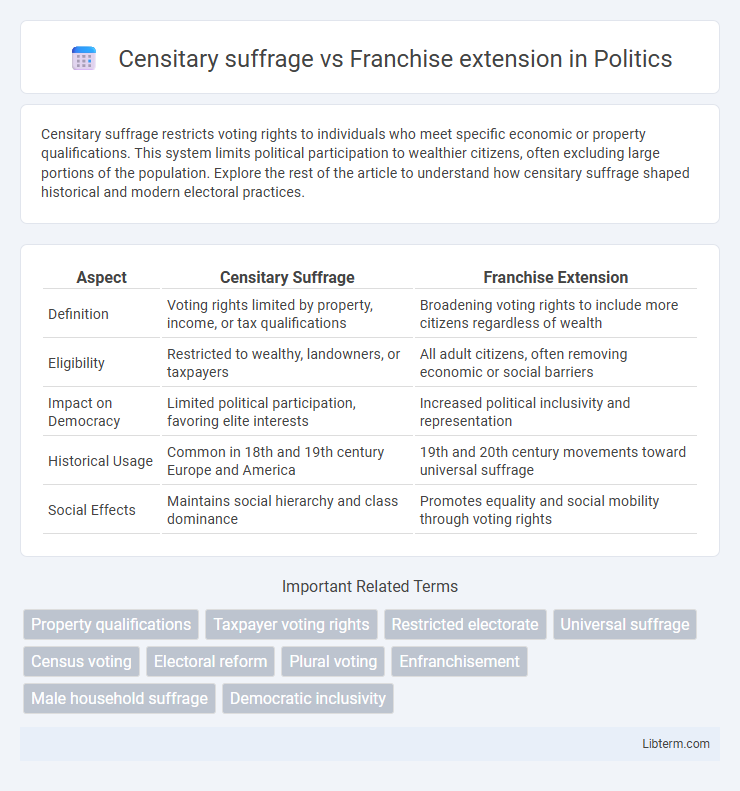Censitary suffrage restricts voting rights to individuals who meet specific economic or property qualifications. This system limits political participation to wealthier citizens, often excluding large portions of the population. Explore the rest of the article to understand how censitary suffrage shaped historical and modern electoral practices.
Table of Comparison
| Aspect | Censitary Suffrage | Franchise Extension |
|---|---|---|
| Definition | Voting rights limited by property, income, or tax qualifications | Broadening voting rights to include more citizens regardless of wealth |
| Eligibility | Restricted to wealthy, landowners, or taxpayers | All adult citizens, often removing economic or social barriers |
| Impact on Democracy | Limited political participation, favoring elite interests | Increased political inclusivity and representation |
| Historical Usage | Common in 18th and 19th century Europe and America | 19th and 20th century movements toward universal suffrage |
| Social Effects | Maintains social hierarchy and class dominance | Promotes equality and social mobility through voting rights |
Introduction to Censitary Suffrage and Franchise Extension
Censitary suffrage restricts voting rights based on property ownership, income, or tax payments, limiting political participation to wealthier citizens. Franchise extension refers to the broadening of voting rights to include wider segments of the population, such as working-class men and eventually women. The shift from censitary suffrage to extended franchise marked a significant expansion of democratic inclusion in many countries during the 19th and 20th centuries.
Historical Background of Voting Rights
Censitary suffrage historically limited voting rights to individuals meeting specific property or tax qualifications, reflecting early democratic practices tied to wealth and social status. Franchise extension emerged as a movement in the 19th and 20th centuries, advocating broader electoral participation irrespective of economic standing, often driven by industrialization and social reform. Key milestones include the Reform Acts in the United Kingdom and the 15th Amendment in the United States, which progressively dismantled property qualifications and expanded suffrage to wider populations.
Defining Censitary Suffrage: Origins and Principles
Censitary suffrage refers to a voting system where the right to vote is restricted based on the payment of a specific tax or census, typically limiting suffrage to wealthier individuals. Originating in the 19th century, this system was designed to maintain political power within the propertied classes by linking voting rights to economic status. Its core principle emphasizes financial contribution as a prerequisite for political participation, contrasting with later movements aimed at franchise extension to achieve universal suffrage regardless of wealth.
Key Features and Limitations of Censitary Suffrage
Censitary suffrage restricts voting rights based on property ownership, income level, or tax payments, limiting political participation to wealthier citizens and excluding large segments of the population such as the working class and women. This system prioritizes economic qualifications over universal citizenship, which often perpetuates social inequalities and concentrates power in the hands of the elite. Despite ensuring informed voters by economic status, its primary limitation lies in disenfranchising marginalized groups and hindering democratic inclusivity.
The Concept and Evolution of Franchise Extension
Censitary suffrage limits voting rights based on property ownership, income, or tax payments, restricting the electorate to wealthier individuals. Franchise extension represents the progressive expansion of voting rights, moving toward universal suffrage by removing economic and social barriers. This evolution reflects democratic development, broadening political participation beyond elites to include marginalized and lower-income groups.
Comparative Analysis: Censitary Suffrage vs Franchise Extension
Censitary suffrage restricts voting rights based on criteria such as property ownership, tax payments, or income levels, limiting political participation to wealthier or landowning classes. In contrast, franchise extension expands voting rights to broader populations, often removing economic or social barriers to create more inclusive democratic systems. Comparative analysis reveals that while censitary suffrage maintains elite control and political stability, franchise extension promotes greater representation, equal citizenship, and the modernization of electoral systems.
Social and Political Impacts of Vote Restrictions
Censitary suffrage, which restricts voting rights based on property ownership or tax payments, often entrenches social hierarchies by limiting political participation to wealthier classes, thereby reinforcing economic inequality. In contrast, franchise extension expands electoral inclusion, promoting broader social representation and enhancing democratic legitimacy by empowering marginalized groups. Vote restrictions under censitary suffrage can lead to political instability and social unrest by alienating large segments of the population from decision-making processes.
Movements and Reforms Toward Broader Franchise
Censitary suffrage limited voting rights based on property ownership or tax payments, restricting political participation to wealthier classes. Movements advocating franchise extension, such as the Chartist movement in the UK and suffrage campaigns worldwide, pushed for universal male suffrage and eventually women's voting rights, challenging these property-based restrictions. Reforms like the Representation of the People Acts expanded electoral inclusion by reducing property requirements and introducing more inclusive voting laws, marking significant progress toward democratic enfranchisement.
Global Case Studies: Shifting from Censitary Suffrage to Universal Suffrage
Censitary suffrage, restricting voting rights based on property ownership or tax payments, dominated early democratic systems across Europe and Latin America, notably in 19th-century Britain and Argentina. The global shift toward franchise extension embraced universal suffrage, eliminating economic and gender-based barriers, as seen in post-World War I reforms in Germany and New Zealand's progressive women's voting rights in 1893. These worldwide case studies illustrate the transition from exclusionary electoral systems to inclusive democracies, enhancing political participation and representation.
Conclusion: The Future of Democratic Representation
Censitary suffrage limits voting rights based on property or tax qualifications, creating an exclusive electorate that often skews political power toward wealthier classes. Franchise extension promotes broader inclusion by removing economic and social barriers, enhancing democratic legitimacy and representation. The future of democratic representation hinges on expanding suffrage to ensure diverse and equitable participation in governance, reflecting the true will of the populace.
Censitary suffrage Infographic

 libterm.com
libterm.com